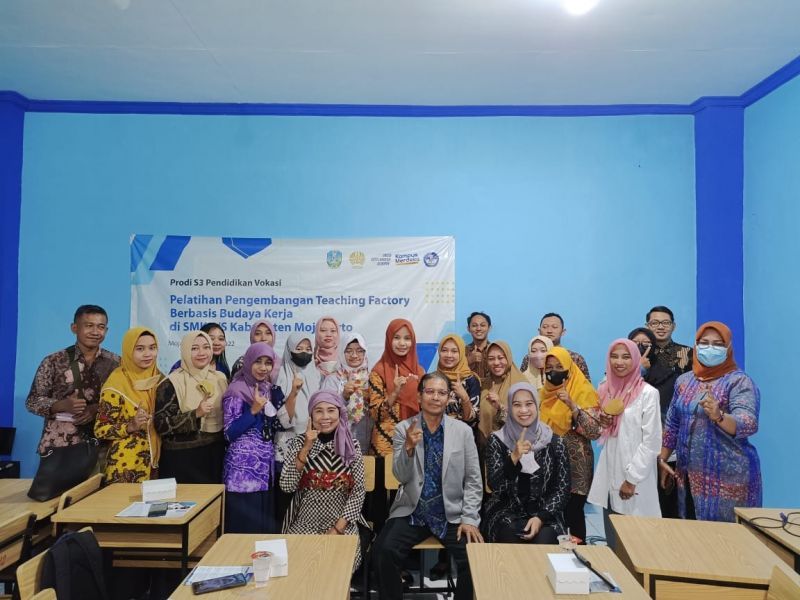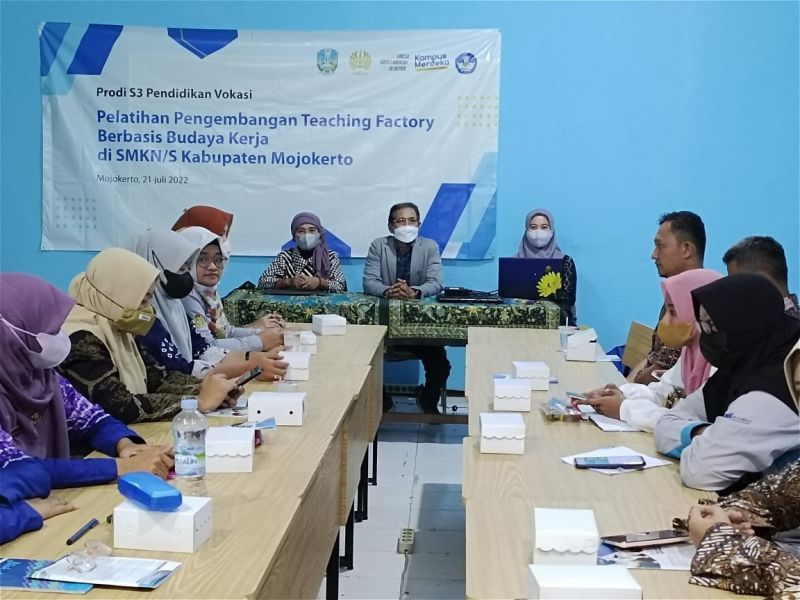
www.unesa.ac.id
Unesa.ac.id, SURABAYA–Vocational high school (SMK) students are directed to be ready to face the world of work and industry (DUDI). Therefore, one of the learning methods used in SMK is Teaching Factory (TeFa). This learning model is production-based which refers to standards and procedures and is carried out in an atmosphere like what happens in industry.
In order to improve the understanding and skills of teachers in applying the learning model, the UNESA lecturer team provided training on the Development of a Work Culture-Based Teaching Factory in Public and Private Vocational Schools throughout Mojokerto Regency on July 21, 2022.
This training aims to equip the teachers there on how to arrange the organizational structure of the teaching factory, plan teaching factory products, arrange block schedules and plan marketing. "This activity includes a follow-up to the same activity at SMKN 3 Nganjuk, on October 5, 2021," said Prof. Dr. Ekohariadi, M.Pd, Chief Executive.
According to him, TEFA learning is a collaboration between schools and industry, which can be used for study and work. "TeFa also contributes to improving students' work readiness before actually entering the real industrial environment," he explained.

www.unesa.ac.id
Dr. Ratna Suhartini, M.Sc., a member of the implementing team explained that the TeFa training in Mojokerto Regency was for various reasons, one of which was that only about 25% of public and private SMKs had implemented the TeFa learning model. Mojokerto has 61 Vocational High Schools consisting of 8 State Vocational Schools and 53 Private Vocational Schools.
This training was attended by 25 participants. The presenters involved are Dr. Ratna Suhartini, M.Si explained material related to TeFa and work culture. There is Prof. Dr. Asto Buditjahjanto, M.Pd who delivered material related to 'RPP and Workshop Lay Out'.
The next meeting was directly handled by Prof. Dr. Ekohariadi, M.Pd. He brought the material 'TEFA Assessment and Learning'. Lastly, Dr. Yeni Anistyasari, M.Kom delivered the material 'E-commerce Marketing Makes Marketing Through the WEB'. Those who are involved in this PKM, continued Ratna, are lecturers who have experience in the TeFa field in a number of schools.
Ratna explained that school is a replication of industry. With this model, students are expected to learn in situations such as in industry. Regarding this model, there are several aspects that need to be considered, including being able to deliver students' competence, quality and selling value according to market needs.
In addition, it takes a continuous stage, and the length of the product process and the duration of the process according to the learning schedule. “Product planning is preparation for all the steps needed to carry out the production and post-production of a project,” he explained.
Through TeFa, the products produced by students must truly comply with market and industry standards. The resulting product can also compete in the market, in terms of price, quality, delivery and market assessment, it is hoped that the turnover, product or service will increase and have a bargaining price and be able to compete with products from the industry.
Prof. Ekohariadi added that through such trainings, teachers and schools can understand the importance of TeFa learning to encourage industry standard innovation in SMK. In this activity, Prof. Dr. Ekohariadi, M.Pd., accompanied by other lecturers and experts such as Prof. Dr. IG. Asto Buditjahjanto., Dr. Ratna Suhartini, M.Sc., and Dr. Yeni Anistyasari, M.T. [UNESA PR]
Author: Hasna
Editor: @zam Alasiah*
Photo: Dr. personal documentation. Ratna Suhartini, M.Sc.,
Share It On:






